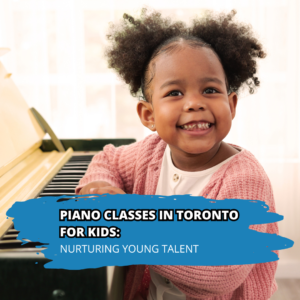Piano Classes in Toronto for Kids: Nurturing Young Talent

The early years of a child’s life are not just foundational for intellectual growth but are also pivotal in shaping their creative and emotional faculties. Introducing children to the world of music, and specifically the piano, opens up a spectrum of developmental benefits that extend far beyond melody and rhythm.
The Importance of Music in Early Development
Music is not just a form of art; it’s a medium that transcends age, nurturing growth and development in children. Introducing kids to music, particularly piano, at a young age opens a world of sensory experiences. It helps in refining their motor skills, enhancing their ability to concentrate and boosting their memory. The piano, with its range of notes and the requirement of hand coordination, serves as an excellent instrument for cognitive development.
It’s not merely about learning scales and melodies; it’s about instilling discipline, patience, and a sense of achievement. Early exposure to piano lessons can lay a solid foundation for children’s educational journey, fostering an environment where creativity and cognitive skills flourish together. The immersive experience of piano learning helps in the holistic development of young minds, shaping them into well-rounded individuals.
Cognitive, Social, and Emotional Advantages of Piano Classes in Toronto
Taking piano classes in Toronto offers a comprehensive experience that impacts more than just musical skills. For children, this journey significantly shapes their cognitive, social, and emotional development. From a cognitive perspective, engaging in piano instruction bolsters brain functionality, enhancing areas such as memory, language, and spatial-temporal reasoning. On a social level, these classes provide a platform for children to engage, work collaboratively, and showcase their talents, thereby instilling crucial teamwork and communication skills.
Emotionally, the discipline required for consistent practice, coupled with the gratification of musical achievements, cultivates resilience and boosts self-confidence. It serves as a therapeutic medium through which children can articulate their emotions and cope with stress effectively. The emotional bond formed with music during these formative years lays a solid foundation for a lasting appreciation for the arts.
Engaging Young Minds: Strategies for Piano Instruction
Engagement is the key to learning, especially when it comes to young children with boundless energy and curiosity. The art of teaching piano to kids is not just about imparting musical knowledge but also about how it’s presented and integrated into their world.
Tailoring Piano Lessons to Children’s Learning Styles
Every child is unique, with their own way of learning and interpreting the world. Piano instructors who recognize and adapt to these individual learning styles can significantly enhance a child’s music education. Visual learners benefit from sheet music and visual aids, while auditory learners thrive through listening and playing by ear. Kinesthetic learners, on the other hand, prefer a hands-on approach, learning through touch and movement.
By incorporating a variety of teaching methods, such as visual aids, ear training, and tactile activities, teachers can create a rich, multi-sensory learning environment. This approach not only keeps children engaged but also ensures that they fully comprehend and appreciate the nuances of music, fostering a deeper connection with the piano.
Incorporating Games and Technology in Piano Classes
The digital age offers an array of tools that can make piano learning more interactive and fun for children. Gamified learning apps introduce musical concepts through play, making lessons enjoyable and engaging. These platforms often use rewards and challenges to motivate young learners, turning practice into an exciting activity rather than a chore. In addition, technology such as digital pianos and music software can enhance the learning experience, providing a plethora of sounds and features that ignite curiosity and creativity. By integrating these technological advancements into traditional teaching methods, instructors can create a dynamic and stimulating learning environment that resonates with the tech-savvy younger generation.
Choosing the Right Piano Class in Toronto
In a city as culturally rich and diverse as Toronto, finding the right piano class for your child might seem like searching for a needle in a haystack. However, the decision becomes clearer once you know what to look for.
Key Factors in Selecting a Kid-Friendly Program
Selecting the right piano class in Toronto for your child involves careful consideration of several factors. The teaching philosophy and curriculum should align with your child’s learning style and musical interests. The qualifications and experience of the instructors play a crucial role in ensuring quality education and a supportive learning environment.
Additionally, the class size, location, and schedule should fit your family’s routine and commitments. It’s also beneficial to choose a program that offers performance opportunities and assessments, providing children with goals to work towards and a platform to showcase their progress. Considering these factors will help in finding a piano class that not only teaches musical skills but also nurtures your child’s overall growth and development.
Spotlight on EliteMusic Academy
Nestled in the heart of Toronto’s dynamic music education landscape, we stand out as a one-of-a-kind music school, offering specialized piano classes in Toronto. This vibrant city, known for its rich cultural tapestry, is the perfect backdrop for our academy, renowned for its well-rounded curriculums, seasoned faculty, and dynamic teaching approaches.
At EliteMusic Academy, we take pride in our tailored approach, providing a mix of individual piano classes in Toronto, complemented by group sessions and public performance opportunities. With a focus on fostering a nurturing and motivating environment, our music academy is dedicated to cultivating the next generation of pianists, ensuring that each child’s musical journey is as rewarding as it is educational. Check out our google reviews!
Fostering a Lifelong Love for Music
The ultimate goal of introducing children to piano is not just to teach them an instrument but to kindle a lifelong love for music.
Encouraging Practice Without Pressure
Cultivating a love for music in children involves encouraging regular practice without making it feel burdensome. Setting realistic goals and allowing flexibility in practice routines can prevent burnout and keep the experience positive. Incentives such as praise, small rewards, or family recitals can motivate children and make them look forward to practicing. It’s important for parents and teachers to be supportive and patient, recognizing that progress in music, like in any other skill, takes time. Encouraging children to explore and play pieces they enjoy, even outside their prescribed lessons, can spark joy and a genuine interest in music. A balanced approach, combining structure with fun, ensures that practice sessions nurture a child’s love for the piano rather than diminish it.
Celebrating Milestones and Achievements
Recognizing and celebrating each milestone in a child’s musical journey is crucial for maintaining their interest and motivation. Milestones can range from mastering a challenging piece to performing in front of an audience for the first time. Celebrations do not have to be grand; even small, intimate gatherings or positive verbal affirmations can significantly boost a child’s confidence. These celebrations acknowledge the effort and progress, making the learning process rewarding. They also provide an opportunity for children to reflect on their growth, instilling a sense of pride and accomplishment. By valuing each step of the journey, parents and instructors can help children develop a positive and enduring relationship with music.
FAQs
1. What role do parents play in the practice routine of their children?
Parents can help establish a consistent practice routine, provide a supportive environment, assist with practice when necessary, and encourage progress by celebrating achievements.
2. What type of piano is best for young beginners?
A keyboard with weighted keys is often recommended for beginners as it provides a feel similar to an acoustic piano and is usually more affordable and space-efficient.
3. Are there piano classes in Toronto that focus on specific genres of music for children?
Yes, many schools, including our music academy, offers a variety of genres in their curriculum. Parents can inquire about the genres taught and choose a program that aligns with their child’s musical interests.
4. How long should each piano practice session be for young children?
Practice sessions should be age-appropriate; for young children, starting with 10-15 minutes per day is recommended, gradually increasing as they grow older and more focused.
5. What are the benefits of enrolling in group piano classes in Toronto compared to individual piano classes in Toronto?
Group piano classes in Toronto offer the benefit of social interaction, peer learning, and collaborative playing, which can be motivating and fun for children, while individual piano classes in Toronto provide personalized attention and tailored instruction.






